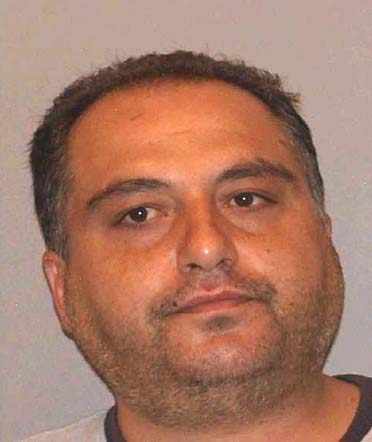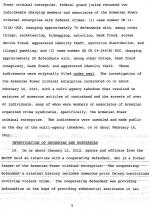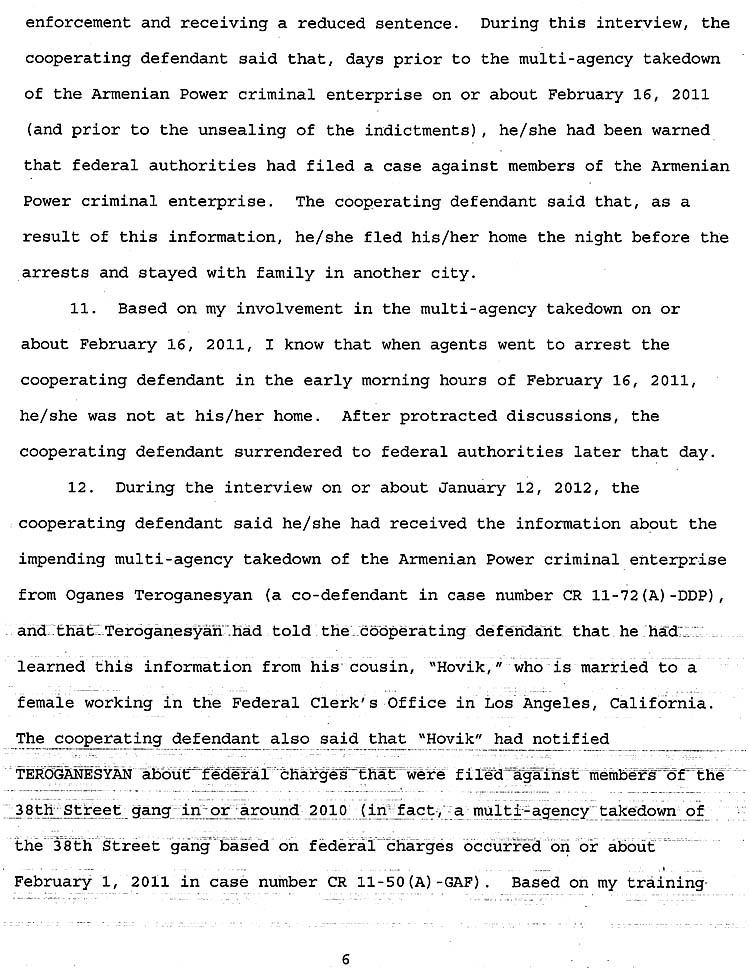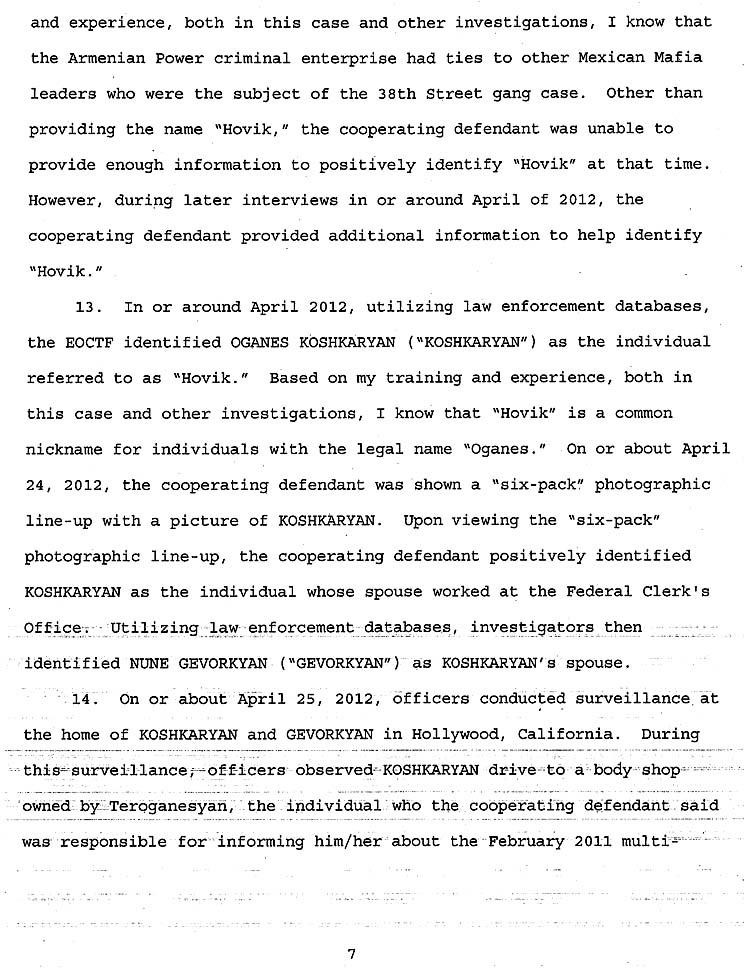FBI: Court Clerk Sold Secret Info To L.A. Hoodlums
Security breach led to couple’s bust on obstruction rap

View Document
AUGUST 16--In a shocking security breach, a federal court clerk in Los Angeles has been charged with selling information from sealed court documents detailing upcoming arrests and law enforcement raids targeting affiliates of an organized crime syndicate.
Investigators discovered the alleged scheme earlier this year after a leader of the Armenian Power gang began cooperating with federal  agents and prosecutors, according to an affidavit sworn by FBI Agent Corrie Lyle.
agents and prosecutors, according to an affidavit sworn by FBI Agent Corrie Lyle.
A subsequent investigation identified Nune Gevorkyan, the U.S. District Court employee, as the source of the confidential information, and found that the woman’s husband, a convicted felon, passed the information on to L.A. crime figures.
Gevorkyan, 35, and Oganes Koshkaryan were named this week in a felony criminal complaint charging them with conspiracy to obstruct justice. Gevorkyan is pictured in the mug shot at right.
The unnamed Armenian Power turncoat--a convicted felon whose rap sheet includes numerous violent crime convictions--was one of 90 gang members and associates indicted last year on a variety of charges, including racketeering, extortion, kidnapping, and narcotics distribution.
The Armenian Power leader told the FBI that days before agents began making arrests in the case, he was warned that prosecutors had filed a sealed indictment against members of the L.A. criminal syndicate. The 200-member crime group, Lyle noted, consists “primarily of individuals of Armenian descent, as well as individuals of other countries within the former Soviet bloc” and has close ties to leaders of the Mexican Mafia, as well as African-American street gangs.
Tipped to his impending arrest, the FBI informant said that he fled his home in mid-February 2011 and stayed with family members in another city. The gang leader subsequently surrendered to agents and, earlier this year, began to cooperate in an effort to secure a reduced sentence.
The source told agents that he was told about the Armenian Power arrests by a codefendant who said that he obtained the information from his cousin “Hovik,” who “is married to a female working in the Federal Clerk’s office in Los Angeles.”
The cooperator said that he was told the court clerk had previously provided secret information about federal charges filed against members of a Mexican crime crew known as the 38th Street Gang.
In April, FBI agents identified “Hovik” as Koshkaryan, a Hollywood resident (“Hovik” is a common Armenian nickname for men named  Oganes). Investigators also learned that Koshkaryan, 39, was married to Gevorkyan, who has worked for the past two years in the “Criminal Intake area” of the clerk’s office at U.S. District Court in L.A..
Oganes). Investigators also learned that Koshkaryan, 39, was married to Gevorkyan, who has worked for the past two years in the “Criminal Intake area” of the clerk’s office at U.S. District Court in L.A..
Koshkaryan, seen at left, was sentenced to a year in prison following a 2001 health care fraud, reported Lyle, an acting supervisor with the FBI’s Eurasian Organized Crime Task Force. Koshkaryan has also been cited on numerous occasions for violating probation terms.
Concerned that security of secret court records had been compromised (directly under the nose of federal prosecutors, agents, and judges, no less) the FBI launched an undercover sting operation targeting Koshkaryan and Gevorkyan.
With the help of a confidential informant, agents recorded Koshkaryan offering to get “confidential information from the court system.” He claimed that his source was a “lawyer” that he knew.
On two separate occasions last month, the FBI’s confidential informant provided Koshkaryan with the name of a criminal associate for whom he sought confidential information. Each of the informant’s purported associates was actually an FBI target who had been named in criminal complaints and search warrants filed under seal in the L.A. federal courthouse.
In fact, some of the sealed records had been brought to the court’s intake window, where Gevorkyan “stamped and accepted the documents for filing,” according to Lyle’s August 14 affidavit. By virtue of her position in the clerk’s office, Gevorkyan had easy access to a wide range of sealed criminal case documents.
Shortly after being provided the name of the first criminal associate, Koshkaryan correctly reported back that the target was being investigated for credit card fraud and would be soon arrested. He also described the target’s criminal history.
The details Koshkaryan provided, Lyle noted, were consistent with information contained in a criminal complaint and search warrant that were under seal. When the informant asked for copies of the actual documents, Koshkaryan said he would try to obtain them, but that it would be difficult.
On July 26, the confidential informant gave Koshkaryan the name of the second associate. Within two days, Koshkaryan reported that the associate was the target of a criminal probe and would be arrested. He added that, “there was a confidential informant cooperating with the  government” in the credit card fraud case, and that “the case was not public and that it was still sealed.”
government” in the credit card fraud case, and that “the case was not public and that it was still sealed.”
During the July 28 meeting between Koshkaryan and the FBI informant, Koshkaryan claimed that he received the confidential information “from a lawyer who has access to sealed federal cases,” Lyle stated. He also confided to the snitch that he “learned about the Armenian Power criminal enterprise takedown before it was made public.”
After the informant paid him $2000 for the information, Koshkaryan said he would be “sharing some of this money with the person who looked up the information for him,” according to the affidavit.
A subsequent FBI analysis of subpoenaed court computer records revealed that “a person using a log-in assigned to Gevorkyan” had accessed sealed court records for both of the informant’s purported criminal associates. Significantly, in both instances, the searches occurred a day after the informant provided Koshkaryan with the names of his criminal cohorts.
In a recorded conversation last week, Koshkaryan told the confidential informant to “make sure that no one discovered how the CI had learned about the impending arrests of Target One and Target Two.” The two men then agreed to let things “cool down” before “additional confidential court information” could be purchased.
Those future illicit sales, of course, will not be happening. Koshkaryan is behind held in L.A.’s federal detention center, while Gevorkyan is free on $120,000 bail.
As part of her release terms, Gevorkyan has been ordered by a federal magistrate to avoid all contact with Armenian Power members and employees of the U.S. District Court clerk’s office. Additionally, she has been directed to “surrender all access device cards, keys, passwords, or other items of access associated with” her job in the clerk’s office. (14 pages)





























